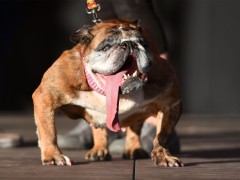adjective [原级]激动的,兴奋的;忧虑的,气愤的;已激发的,受激的;性兴奋的 - Right now I'm feeling very excited.
verb [vt. 及物动词]使兴奋,使激动;激发,引起(excite 过去式和过去分词形式) - An excited crowd of people gathered around her.
noun [专属名词]上车:指登上交通工具,如公共汽车、火车等。进展、相处 - Where do we get on the bus?
get in the car 小车
get on the train 大车
- Please get ready to get off the bus. 请做好下车的准备
adjective [原级]中年的;具有中年人特点的;适合于中年人的 - The guests were mostly middle-aged men talking business.
adjective [原级]完全相反的,截然不同的;相反的,另一边的;(在说话者、所指的人或物)对面的;(角)对的;(叶,芽)对生的 - Exactly the opposite is true.
noun [抽象名词]对立的人(或物),对立面;反义词 - What is the opposite of heavy?
adverb [方式副词]在对面,在对过 - He sat down in the chair opposite.
preposition [位置和方向]在……对面,与……相对;与……合演,与……联袂演出 - He dropped gracelessly into a chair opposite her.
adverb [方式副词]好奇地 - 'Are you really an artist?' Sara asked curiously. “你真是画家吗?”萨拉好奇地问道。
adjective [原级]滑稽的,有趣的;古怪的,难以解释的;微恙的,稍有不适的;生气的,不友好的;疯疯癫癫的;出故障的;可疑的,不诚实的;放肆的 - She found it hilariously funny.
noun [具体名词]<美>(报纸上的)滑稽连环漫画;<非正式>笑话 - I'll tell you a funny story.
adverb [方式副词]古怪地,奇怪地 - He was walking a fine line between being funny and being rude.
noun [具体名词]粉,粉末;扑面粉,美容粉;细雪,粉状雪;火药,炸药 - The snow was like powder.
verb [vt. 及物动词]往(脸或身体)上搽粉;撒粉(状物)于(表面),以粉(状物)覆盖;使(某物)成粉状;变成粉末 - The seeds were pounded to a fine powder.
adjective [原级]小型的,袖珍的;紧凑的;紧密的,坚实的;矮小而健壮的;(演讲,作品)简洁的,简练的 - Their bodies are sleek and compact.
noun [具体名词]带镜小粉盒;合约,协定;小型汽车;袖珍物;坯块 - The article is compact and well organized.
verb [vi. 不及物动词]压紧,压实;缩短,精简;订立(或签订)(协定) - It was indeed very compact and comfortable.
adverb [方式副词]亲切地;温和地;仁慈地 - She spoke kindly to them.
adjective [原级]亲切的;和蔼的;体贴的;爽快的 - A kindly twinkle came into her eyes.
adjective [原级]丑陋的,难看的;(通常因涉及暴力、挑衅行为而)令人厌恶的,邪恶的,恶性的;无礼的;道德败坏的;可怕的,恐怖的;难听的,不悦耳的 - Everything is hideously ugly.
adjective [原级]被逗乐的,觉得好笑的 - Sara was not amused by Franklin's teasing. 莎拉没有被弗兰克林的逗趣儿逗笑。
verb [vt. 及物动词]逗乐,逗笑;(提供)消遣(amuse 的过去式和过去分词形式) - We were all amused at his stories. 我们都被他的故事逗笑了。
verb [vi. 不及物动词]微笑;微笑着说,以微笑表示;现出(笑容);觉得好笑,觉得高兴;惠及,赞许 - His face cracked into a smile.
noun [具体名词]微笑,笑容;一脸笑意,喜滋滋的(all smiles) - Her face creased into a smile.
laugh [lɑːf] [læf] : v./ n. 大 笑
- He said and smiled.
- She is telling me a story with a smile.
- They are talking and laughing.
adjective [原级]尴尬的,窘迫的;拮据的,陷入经济困境的 - He looked faintly embarrassed.
verb [vt. 及物动词](使)尴尬,窘迫;使难堪,使为难(embarrass 的过去式和过去分词形式) - His clumsiness embarrassed him.
adjective [原级]担心的,发愁的 - I was worried you wouldn't come.
verb [vt. 及物动词]担心,发愁;使担忧,使发愁,使焦虑;烦扰,使不安宁(worry 的过去式和过去分词) - She had a worried look on her face.
adjective [原级]定期地,有规律地;频繁地,经常地;均匀地,匀称地;(语法)变化规律地 - She regularly goes parachuting.














